#and with his black and white morality even the more questionable stuff isn't even given a second thought
Explore tagged Tumblr posts
Text
Okay, I've got one more bone to pick about the way people mischaracterize Levi's refusal to tell Jean that killing is right as Levi actually making some sort of moral statement and expressing his belief that killing is wrong. I really do wonder how people come up with this stuff.
Levi saying he doesn't know whether Jean choosing not to kill is right or wrong isn't the same as him saying he thinks killing is wrong. It’s Levi allowing Jean to decide that for himself, based on his own, personal beliefs and the objective reality of the situation, while acknowledging that for himself, Levi is able and willing to kill dependent on the circumstances. It's Levi NOT making a moral judgment on killing, or trying to convince anyone else of the moral rightness or wrongness of killing, and to try and frame it as such is pure projection. It's projecting ones own moral beliefs onto Levi and trying to twist his refusal to moralize this issue as some sort of proof that he's morally against it.
Again, though, for Levi it's not even a moral question. It's a question of objective reality. He doesn't try to justify killing to himself through some moral framework, nor does he condemn himself or others for killing in and of itself. Again, it's not about morality to Levi. It's just about objective reality. As in, if I don't do this, then this other thing will happen, and I have to decide which choice sits most right with me, which course I feel is correct in the moment. Either I let myself and my comrades get killed to uphold some static, black and white moral standard and worldview, or I kill the people trying to kill us and save lives in the process. Again, it's not a question of morality, it's a question of practical, objective reality. It’s about objectively acknowledging action and consequence and then weighing, based on that, which choice you feel is best. Where the morality comes in is in which of those options you believe most aligns with your own personal sense of right and wrong.
Also, this repeated claim that Levi is morally grey is wrong, because again, Levi's entire philosophy of no regrets is based on moral conviction. Do what you FEEL is right in the specific situation you're in, whether the outcome proves it to have been the right choice or not, and that way you'll have no regrets, because you'll have not compromised your moral values. I've said it before that Levi is the most morally consistent character in the series. He never compromises his moral values, something perfectly demonstrated in his choice during the RtS arc. When he does something quote on quote "bad", like killing or committing acts of violence, it's because he believes it's the best course of action in any, given scenario.
What people just don't get about Levi is that his moral values aren't static and don't adhere to one, single school of thought, i.e. "killing is always wrong". Levi's morality is fluid depending on the situation. That doesn't mean he has no moral conviction, it means he understands that morality itself is a complex and multi-faceted concept that isn't easily defined or pinned down.
And he doesn't try to force his way of thinking onto anyone else, as demonstrated, again, during the Uprising arc and his exchange with Jean and Armin. People seem to take that to mean that Levi is making some sort of statement as to the wrongness inherent in the act of killing. But again, it's got nothing to do with how he views killing morally, it has to do with Levi respecting the agency of others and allowing them to choose for themselves what they think is right and wrong, or what they think is best. Levi clearly doesn't view killing as "wrong no matter what" or he wouldn't do it. There would never be a circumstance, then, in which he felt killing was the best course. There would be no situation in which he chose to kill, or in which he didn't regret killing. Just because Levi doesn’t deign to tell Jean that he was wrong for not killing doesn’t mean Levi himself views killing in and of itself as wrong.
Again, it’s just him respecting Jean’s agency and acknowledging that he himself doesn’t know for certain what the right and wrong choice is. That doesn't mean there aren't circumstances in which he views killing as wrong though, either. He clearly does view killing in certain circumstances as wrong, just like he views it as right, again, depending on the circumstances, like what Zeke did to the people in Ragako village, etc… Killing innocent people who pose no threat to you is clearly wrong in Levi's eyes. See his disgust at Zeke, or at Kenny for killing members of his squad. Obviously Levi has his own moral standards. He’s just not a big enough dick to try and tell others that his personal beliefs should also be theirs. He’s not so arrogant or egotistical as to try and impose his personal beliefs and feelings on anyone else. That’s why he says he “doesn’t know” what’s right or wrong. Because he doesn’t. Nobody does. He can only go by what he personally feels and dictate his own actions by that. What everyone else does is up to them. He can form personal opinions about their actions, but he doesn’t try to tell anyone one way or another what they should do, again, because he actually respects other people and their choices.
Honestly, so many of these bad takes come down to people's inability to view anything free from the constraints of their shipping goggles. They always approach their understanding of Levi's character from the premise that their ship is canon and work backward from there. In particular, you see these takes coming from the eruri fandom, where some people in that community want to believe that Levi has compromised his moral belief that killing is wrong because he just looooves Erwin so much and is willing to sacrifice everything for his beautiful blonde hunk, lol. So they have to re-frame Levi's refusal to make a moral judgment to others on the act of killing as him actually making a moral judgement on the act of killing. That way, they can then claim that Levi sacrifices his moral values for Erwin because he just loves him so, so much, instead of approaching it from an objective viewpoint, which would then lead them to the obvious conclusion that Levi follows Erwin's orders and is willing to kill people because those actions, dependent on the circumstances, fall in line with what he personally values morally, i.e. doing what's best for humanity, i.e. saving the lives of the people he's directly responsible for.
Those are actions taken and guided by Levi's morality. It's why he's so upset when he learns that Erwin's main goal isn't to secure humanity's victory, but to discover what's in Eren's basement, because it throws into question whether Levi's been making the right moral choice all these years in following Erwin's orders. Levi chose to follow Erwin because he believed Erwin's own intentions were pure and it would allow Levi to help people in the most effective way possible.
Just to lay out further why saying Levi thinks killing is wrong is a ridiculous take, I want to reiterate that it's not about Levi choosing what he thinks or knows is "right" in the moment, it's about Levi following his heart. Following ones personal, moral beliefs won't always lead to the "right" outcome.
Levi doesn't know if ANYTHING is the "right" answer, and that's what his entire philosophy is predicated on. Not knowing whether his actions will lead to a desirable or good outcome, being able to accept that he doesn't know what the outcome will be, but not allowing that uncertainty to instill doubt or hesitation in him and his choices.
He follows what he FEELS in his heart is right, but he won't and can't give a definitive answer about whether it absolutely is or not. The way Levi is able to live with no regrets, as he says, is because, regardless of the outcome, whether good or bad, he knows he did what his heart told him to do in the moment. And yes, that includes killing in certain situations.
It has to do with practical reality. If your life is being threatened, and you know, if you don't take the practical action of killing the person threatening you first, it means your life or the lives of others will with certainty end, then you are absolutely, 100% justified in killing that person.
I've said this a million times already, but there's a very GOOD reason there's a distinction made between "murder" and "justifiable homicide" within the actual law. Like I said before, to criticize Levi for failing to be a pacifist, when his pacifism would have led to him and others being killed, is the definition of cruelty and ignorance and exposes those giving the criticism as having led breathtakingly pampered and privileged lives.
Isayama's story isn't meant to lead the reader toward condemnation of the characters for engaging in acts of violence and killing, or to make you think of them as "bad people" for doing these things. It wants to lead the reader toward understanding that it's the circumstances that force one into a position of having to kill to protect themselves and others that should be condemned.
Killing is "bad", yes, but that doesn't mean a person who kills is bad themselves, or morally wrong. Circumstances like war, like prejudice and persecution, like social ostracization and disenfranchisement are the real villains of AoT. It's why very few, if any, of the characters in AoT are framed as purely villainous. We aren't meant to think of any of them as "bad guys", per say, we're meant to think of the circumstances that led them down a specific path as bad. That's not to say there aren't bad people in AoT. There very much are. People that kill for pleasure, people that revel in violence and in hurting others. People that use their circumstances in life as an excuse to hurt others without there being a practical or understandable reason for it. Just like there are good people in AoT, too. People who, despite their circumstances in life, still extend great compassion and kindness and love to others. And yes, Levi is one of those good people.
These people also try to take Armin's statement that they're all "bad people" now as the narrative somehow trying to tell the audience the same, while never acknowledging that Armin's statement here is taken out of context, without regard to Armin's own bias against himself.
Isayama doesn't say Armin and the others are "bad people" for killing, he simply says they're troubled by having killed because there's this idea conditioned into them from the lives they've led that killing is wrong, no matter the circumstances. Whether one believes that or not though comes down to individual perception and moral belief, which in itself proves that morality isn't a static concept, but rather one that operates on a sliding scale, determined upon ones individual and personal views. Views which can be influenced, of course, by ones environment and societal norms and pressures. It isn't a definitive statement as to ones moral worth as a person, as to their morality or immorality, or a declaration on whether any of these characters are good or bad.
I could just as easily argue, and I have, that it's worse and more morally ambiguous to refuse to kill to uphold ones own sense of moral righteousness if that refusal leads to other people being killed. That kind of rigid moral standard shows a refusal to understand that morality is a complex concept with no, clear definition and could easily be seen as prioritizing ones individual sense of self-righteousness above the lives of people. It's why Armin later refuses to sit out the fight at the docks, despite Reiner's offer for him and the others to do so, because he refuses to put his own sense of moral comfort above what he feels is the right and necessary course of action. Armin's perception of their situation and of himself morally isn't 100% objective on any level. Yes, Armin feels he's a bad person for having killed, but that doesn't mean it's objectively true. Seeing killing as wrong, no matter the reason, is a dangerous and entirely unrealistic and impossible standard to live up to.
One more point. Levi is very firmly "morally good" based on general standards of moral goodness, because every action he takes extends out of a place of kindness and compassion, and as I stated before, he never compromises that morality. His compassion is his defining trait as a character and it dictates his every action.
Once more, it's what Levi's "no regrets" philosophy is predicated on. As long as you make the choice that you genuinely believe is the best course at the time and so long as it's rooted in and coming from a place of genuine compassion and kindness, (which again, Levi's actions always are), then even if the result is horrible, you still won't have any regrets because your decision was made by following what you felt in your heart was right. Not "knowing" what's right, but following what your heart tells you is right, according to your own, personal beliefs. It's about not beating yourself up for things out of your control.
Of course, this is probably what certain people in the fandom mean when they say Levi just does what he wants without concern for the consequences, but that's not what Levi is doing at all. He's simply acknowledging that he can't predict the outcome of anything, no matter how much knowledge he has, or how prepared he is, and so all he can do is make the choice he feels is the best one at the time, depending on the circumstances. Of course Levi would hope that it turns out alright, and that's what making the choice you feel is best is all about. Doing as well as you can and hoping it turns out good, but accepting that if it doesn't, it doesn't reflect on who you are as a person. The way some people frame it though, in typical fashion, is that Levi just does what he wants and doesn't care how it turns out. It's literally the most ungenerous and negative interpretation one could have of a genuinely honorable and wise philosophy.
It's also absurdly disingenuous to claim that Levi doesn't care about the consequences of his actions. He absolutely cares. He cares more than anybody. That’s why you can say, objectively, that Levi is a good person, because he genuinely wants everybody to be okay. He feels genuine compassion and empathy for others and makes every decision he does out of a pure desire to protect people and save lives, or out of a genuine desire to honor those lives or bring comfort. He just knows and accepts that no matter how hard he tries to get it right, no matter what precautions he takes or knowledge he brings to bear on any situation, no matter how sound he feels his judgment is, it could still all turn out wrong, and there's no point in dwelling on that, because all it will lead to, in the end, is a paralyzing fear which helps no one.
31 notes
·
View notes
Text
Ya know SMTIV, what this is actually perfect. Remember what I said about how Nasu could never be asked to show even a modicum of respect to Tezctalipoca as a figure, and how the "Tezcatlipoca" in FGO in no way has the spirit of their alleged origins?
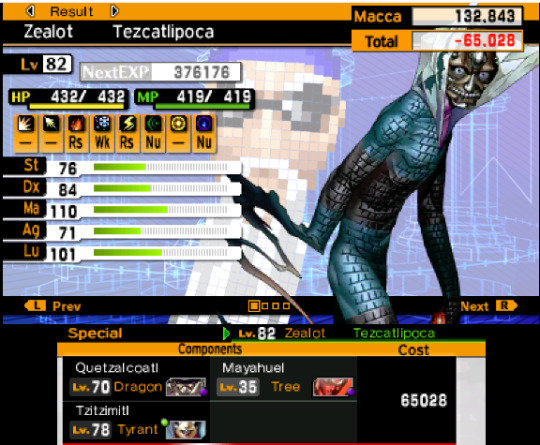
Well I don't care much for this design either.
In fact I don't like SMT's (or more specifically Soejima's, who is still very much talented as I'll make clear) Tezcatlipoca design at all. I personally find it ugly and having an aesthetic I'm not that fond of, particularly the sort of "Bigfoot sighting" pose he has going on.
But i don't hate it, and I certainly am not morally opposed to it like FGO's, because even if I personally dislike it, ya know what it is? It's still undeniably based on Tezcatlipoca and keeps that spirit in several ways evident through design alone, let alone the way he's implemented into the game itself. It's a design that feels like it respects the culture it's taking its name from, and I'd much rather it do that than have an aesthetic I'm more fond of but lack any representation of its source material.
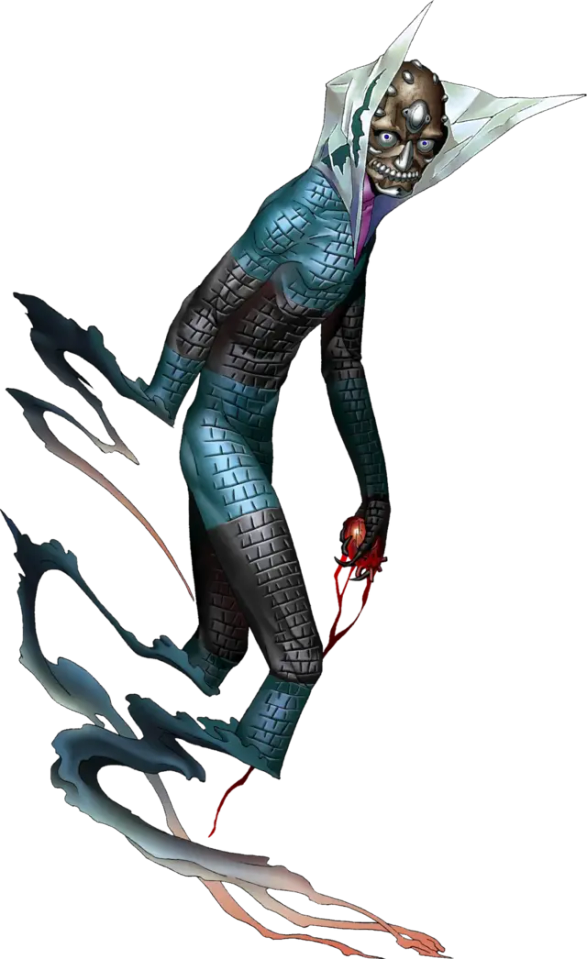
Just on a surface level you can see the ways in which this is meant to be Tez.
Holding a human heart with one arm, which were sacrificed to him in Aztec rituals
His body is visibly black and navy blue and made of a stony substance, which is a reference to the association many aztec gods but especially Tez had with obsidian rock, and the main symbol of Tez is an obsidian mirror.
Despite this, his other arm and legs are dissolving into smoke at the end, which is a reference to his main title of Smoking Mirror.
His skull-like head is pretty clearly meant to invokes a Calavera, which even if you didnt know the name of you've probably seen if you've ever witnessed a Day of the Dead festival.
That's all just the surface level stuff. There's plenty more if you know to look for it.
While one of his arms is visible, neither of his legs are, which fits with how Tezcatlipoca lost at least one of his legs to the giant crocodile Cipactli when the world was created
While blue isn't the primary color Tez is associated with, the use of teal/navy blue specifically fits with how he was often depicted with an almost interchangeable combination of grey-ish dark blue and black.
Despite my "bigfoot posture" remark, it very much fits Tezcatlipoca, whose spirit animal was the Jaguar, an animal well known for stalking and ambushing prey (rather than chasing it down like African big cats are known to do).
the way the smoke curls around as if forming an extremely distorted prosthetic foot matches how Tez's missing foot is specifically portrayed in the Codex Yohualli Ehécatl (AKA, the source of the image on Tez's wikipedia page), particularly with how the coloring shifts to orange-yellow at the end.
The most shaky but still worth noting claim: The emphasis on the blood flowing from the heart, combined with the gems embedded in Tez's head, could even be a reference to the Ezpitzal, which while looking very different in mesoamerican art still is no doubt connected, given how the key traits are flowing blood and embedding precious stone in [a crown above] the head.
So....do I like this design? No, personally, not really. I'm way too much of an edgelord to settle for such a toned down and subtle design for a figure like Tezcatlipoca.
Do I respect this design? Absolutely, zero question. It's the kind of design you could never get if they didn't at least TRY to research Tezcatlipoca, let alone do so well (at least i can only assume well based on the result). That's the difference between this design and "some white guy from the GAP who likes guns". You can tell they gave a shit, not just in general but specifically in regards to the culture being referenced.
(Oh, and also unlike FGO Tezcatlipoca, I don't need to be told "someone famous drew it" to be able to figure out someone talented drew it. )
#none of this even gets into mechanics like how you combine Quetz with a Heart and an Aztec god of night to get Tez#or how he has extremely high magic and mana as a figure known for their wisdom#or how he's a Zealot which represents how he is dark but not evil and has been harmed for his beliefs/actions in his own myth#hence how this design emphasizes his missing limb(s) much more than his original design. Pre-Strange Journey he#had a different much more antagonistic portrayal so he was seen as a mainstay of the Vile race#which fits how Tezcatlipoca is often misconstrued as a pure evil being rather than the Yin to Quetz's Yang#fgo#shin megami tensei#smt iv#peak character design#i may not personally like it#but it's absolutely good character design#fate grand order#fgo tezcatlipoca#tezcatlipoca#mythology#aztec mythology#long post#nasu is a hack#dont play gachas kids#character analysis
78 notes
·
View notes
Note
What do you think of the 2005 Question mini? I understand it's a bit controversial among the Question die-hards.
I definitely have mixed feelings, which I think I'll put under a read more bc this got longer than expected.... Whoops.
Okay. So. I think it's valuable in the sense that it kinda sets up how Vic is often written post-2005 (hyperviolent & mystical), and I think it dips back into the Ditko-era "be totally convinced what you are doing is right, even if you're burying people alive in cement with a backhoe" mentality, which can be kind of fascinating in combination with the magic stuff.
At the same time, though, I wouldn't consider it "in character" exactly. It's one of those oddball runs. I guess it's closest to The Deaths of Vic Sage in terms of content and character choices (which, depending on how you feel about that, you may or may not like), and isn't what I would consider to be a "here, this is a cool DC character. Check it out!" kind of story. Like. Can you imagine giving someone the 2005 run and saying "yeah this guy has an amazing inner battle and I think he's totally fascinating as a study of how morals can twist as you experience more and more grey situations". I think I would get some strange looks.
That all being said, I think there's a certain point where it gets kind of hysterical watching Vic Sage, high out of his mind, run around Metropolis seeing ghosts. There is something fun about that. The Question has always been a character that played with reality and what could be considered "objective truths", so drugs are nothing new. It's cool to see how an extremely subjective view can influence what a person does in a situation where the answer might not be black and white (although to be totally honest, I think he overreacts severely in the 2005 run.... But I'll get to that in a minute.)
One thing that I'm totally sure about on the story is the plot point about Vic and Lois going to journalism school together and having some kind of tension. Unlike Lois, though, I don't think the poems Vic wrote were about her. I honestly think they were about him. They're almost entirely about finding the hidden side of someone, and seeing secrets that they don't want others to see. They don't read as someone publishing poetry about their crush, they read as self exploration through poetry. I think Vic's shame about Lois thinking they were about her shouldn't have been an unrequited love thing, and I definitely don't think it should have influenced Vic's decision making to the point that he decides that killing willy nilly is totally justified, especially if you think about other times he's killed for love (like in the first Question Quarterly). It wasn't the kind of reaction you would expect from him given the situation. I do think it was an interesting detail, though, regardless of the romance issues. Not even going to get into what Superman might have thought about hearing that poetry and then running out to find the writer reenacting Bob the Builder with gore.
I think that my favorite thing about the run was seeing Vic literally walk in two worlds. You get the social aspect of him not fitting in with his peers while also being seperate entirely from heroes (although I wish they'd shown this more), while also literally having a split in the art to show how divided his thinking is. It's a cool way to showcase how the character is a little different from the version of him in, say, Mysterious Suspense, where a black and white character is literally portrayed in black and white (which, while maybe not an intentional choice, I believe has artistic merit for who the character is and what he embodied). Plus, I think the parts where you see how he sees the world (at least, how he sees it while on powerful psychedelics) are really visually interesting. I <3 bright colors.
Overall, I think it's okay. It's a weird one, and it belongs in the ranks with Frank Miller's Batman comic, PAX, TDOVS, Trinity of Sin, that one 9/11 thing that I don't remember the name of, but I think it's worth a read if you already have a solid understanding of the character and want to see an interesting portrayal. If we rank the 80s run as a 10/10 and PAX as a 1/10, I would put 2005 at a solid 6.
#seal.txt#strejdaking#ask#question 2005#<- tag you can check out for me talking about it more#and pictures#also its early so please forgive any strange grammer issues here#book club
4 notes
·
View notes
Note
The cushioning of bella's pregnancy is disappointing to me, bc not only did it cut out healthcare concerns but it also cut out bella's indecision, which could have been even more interesting. I mean, I don't have any experience with normal pregnancy, but surely there would be a period of soul searching when she found out she was pregnant? In an ordinary pregnancy, almost certainly, even if she would become attached after a while. And this isn't a normal pregnancy! She's dying and breaking bones and vomiting and needing to be carried from the couch to her bed. I could accept that maybe maybe she decides eventually to keep it (bc it's edward's or she's aware she won't have this chance again when she's a vampire or whatever) but her pregnancy only lasted a month! A MONTH. There's no way at least a part of her isn't wondering if she's making the wrong choice or whether she's going to die, which she must be scared of even if she's willing to accept it. That could have really been something to the cullen family too! I doubt Carlisle would be as staunch in his support if bella is visibly scared and indecisive and I want to see rosalie express some raw emotion, desperation, compassion, anger at edward for trying to persuade her in such a scenario, with bella wavering and crying in stress and stuff, not just her being so determined she won't be swayed by Edward's (and everyone she's close to) obvious pain and fear and worry. That really would have been something.
Originally in "Forever Dawn" the whole story was from Bella's POV, so even the pregnancy. Perhaps in that version we got more of what Bella was thinking, more of her doubts, more of her worry? But perhaps not--SM's characterization of Bella is basically that once she decides something she is All In. So once she decided she was keeping this baby ("not any child but THIS child, Edward's child") and how it "wasn't a choice, it was a necessity" I don't know if SM would really have allowed Bella to waver or worry or question too much. She was going to do this, she was right about this, it would all work out somehow damn it. At least that's the 'tone' I seemed to get from what we do see of Bella in Jacob's portion of the book.
Overall I think the whole pregnancy needed more nuance. It's all so black and white. It's "Keep the pretty perfect baby alive!!" or "abort the bloodsucking hell demon!!!" and like, there's a lot more gray area here? This isn't a typical pregnancy. They really don't know how vampiric this entity will be, and it's growing so quickly they know that whatever it is, it isn't entirely human. That's a valid discussion. It's also pretty clearly putting Bella's life at risk, and most religions will allow termination of a pregnancy if the mother's life is at risk (the Mormon stance, for example: "The Church allows for possible exceptions for its members when [. . .] a competent physician determines that the life or health of the mother is in serious jeopardy."), which Bella's very clearly is. FORCING Bella to terminate is morally repugnant, but explaining the situation to her, trying to convince her from a sense of worry for her, begging her out of desperation to reconsider . . . all that seems reasonable and even appropriate considering the circumstances.
Esme is the only one in the family who has ever been pregnant or given birth, and as usual she isn't given much of a voice here. Carlisle's mother died in childbirth, which never comes up or seems to be a factor in this discussion at all, but it seems relevant when Edward in storming around in the movie, at least, all "how could I love it if it killed you?" like oh hey! There's a potential character interaction here that would be really intr--oh? we're not going to even mention it? Not even hint at it? Really? But she specifically wrote that his mother died in--? Okay. Whatever.
It's just all so oversimplified and taken to extremes and these deeper, more nuanced discussions aren't happening and honestly that all seems much more interesting to me than the "precious baby!" vs "kill the demon!" stances we got. The idea that everyone would be firmly in one camp or the other seems wholly unrealistic to me and frankly, kind of boring.
168 notes
·
View notes
Note
I hate how stansas are all like "Sansa will become a genius at the game of thrones, but she'll keep her moral compass so she'll be the perfect queen". First, they should stop pushing that stupid idea that being good at the game is the same as being a good ruler, it just isn't. Second, Sansa's compassion is not nearly as significant as to say it will definitely stop her from playing dirty, she is not the mother theresa fandom thinks she is. And third...
[Cont.d] ...ALL the characters are getting darker next book, I'm an Arya fan and I'm mentalizing to face that she'll do dark stuff next book, Why tf would Sansa be above the rest? For god's sake she's gleefully following a plan for her personal benefit that relies on her own cousin dying without feeling too sad about it. Among other things. Sansa is not that special, she'll get her hands really dirty just like the rest and being naive isn't going to be an excuse.
Yeah it is kind of infuriating. Aside from the game, which I’ll get to in a minute, we are told constantly that being a leader requires a certain hardness, a willingness to do morally questionable things, that it leads to a colder or darker personality given the difficult decisions, and makes the leaders lament their lost naivety and wish they still had little responsibility.
Look at Jon:
You would weep as well if you had a son and lost him, Sam almost said. He could not blame Gilly for her grief. Instead, he blamed Jon Snow and wondered when Jon's heart had turned to stone. Once he asked Maester Aemon that very question, when Gilly was down at the canal fetching water for them. "When you raised him up to be the lord commander," the old man answered.
- Samwell III, A Feast for Crows
Jon felt as stiff as a man of sixty years. Dark dreams, he thought, and guilt. His thoughts kept returning to Arya. There is no way I can help her. I put all kin aside when I said my words. If one of my men told me his sister was in peril, I would tell him that was no concern of his. Once a man had said the words his blood was black. Black as a bastard's heart. He'd had Mikken make a sword for Arya once, a bravo's blade, made small to fit her hand. Needle. He wondered if she still had it. Stick them with the pointy end, he'd told her, but if she tried to stick the Bastard, it could mean her life.
- Jon VI, A Dance with Dragons
It’s stated, plain as day, that Jon becoming Lord Commander marked the end of his days being, for want of a better word, kind and emotional, as he started having to make tough decisions that would not please everyone and would absolutely break some, but were necessary to keep his people safe and ensure victory. In the second quote, we see this sense of duty and coldness over emotion also applies inwardly, as he curses the fact that he can’t help Arya when he desperately wants to. Choosing to help Arya is ultimately what cause his death too, and coming back from that will only make him even darker.
Let’s look at Dany too:
She dreaded what must come next, yet she knew she had put it off too long already. Yunkai and Astapor, threats of war, marriage proposals, the march west looming over all . . . I need my knights. I need their swords, and I need their counsel. Yet the thought of seeing Jorah Mormont again made her feel as if she'd swallowed a spoonful of flies; angry, agitated, sick. She could almost feel them buzzing round her belly. I am the blood of the dragon. I must be strong. I must have fire in my eyes when I face them, not tears.
- Daenerys VI, A Storm of Swords
"No . . . no." He shook his head. "I never meant . . . forgive me. You have to forgive me."
"Have to?" It was too late. He should have begun by begging forgiveness. She could not pardon him as she'd intended. She had dragged the wineseller behind her horse until there was nothing left of him. Didn't the man who brought him deserve the same? This is Jorah, my fierce bear, the right arm that never failed me. I would be dead without him, but . . . "I can't forgive you," she said. "I can't."
"You forgave the old man . . ." [...]
“Remove this liar from my sight,” she commanded. I must not weep. I must not. If I weep I will forgive him. Strong Belwas seized Ser Jorah by the arm and dragged him out. When Dany glanced back, the knight was walking as if drunk, stumbling and slow. She looked away until she heard the doors open and close. Then she sank back onto the ebony bench. He's gone, then. My father and my mother, my brothers, Ser Willem Darry, Drogo who was my sun-and-stars, his son who died inside me, and now Ser Jorah . . .
"The queen has a good heart," Daario purred through his deep purple whiskers, "but that one is more dangerous than all the Oznaks and Meros rolled up in one." His strong hands caressed the hilts of his matched blades, those wanton golden women. "You need not even say the word, my radiance. Only give the tiniest nod, and your Daario shall fetch you back his ugly head."
- Daenerys VI, A Storm of Swords
One would be dead before the sun went down. No queen has clean hands, Dany told herself. She thought of Doreah, of Quaro, of Eroeh … of a little girl she had never met, whose name had been Hazzea. Better a few should die in the pit than thousands at the gates. This is the price of peace, I pay it willingly. If I look back, I am lost.
- Daenerys VIII, A Dance with Dragons
Dany has not been as affected by Jon, she is still a young girl with a lot of hope and sympathy, but it’s clear throughout that she takes being queen to heart and she knows that means showing strength at times rather than tears. Much like with Gilly, Dany has to make the hard decision with Jorah, even if she wanted to pardon him. He was not contrite so she could not forgive him without seeming weak or foolish. And we see this internal struggle again with the fighting pits, a practice she abhors, but knows she must endure it for her people. Being a leader, she makes tough decisions and has to desensitise herself as much as possible, and Winds promises that she will be darker too.
Hell, we even see this happen with Robb.
Only Robb and baby Rickon were still here, and Robb was changed. He was Robb the Lord now, or trying to be. He wore a real sword and never smiled. His days were spent drilling the guard and practicing his swordplay, making the yard ring with the sound of steel as Bran watched forlornly from his window. At night he closeted himself with Maester Luwin, talking or going over account books. Sometimes he would ride out with Hallis Mollen and be gone for days at a time, visiting distant holdfasts. Whenever he was away more than a day, Rickon would cry and ask Bran if Robb was ever coming back. Even when he was home at Winterfell, Robb the Lord seemed to have more time for Hallis Mollen and Theon Greyjoy than he ever did for his brothers.
- Bran IV, A Game of Thrones
This rings extremely close to Jon not sitting and eating with his friends as he used to. So, even ignoring the game of thrones cause none of these are playing it, being a leader creates a sterner, harder person than when they weren’t leaders, and this isn’t even everyone we see this in. Same happens with Bran for a time, Tyrion, Arya, etc. so there’s no way that if Sansa ever became queen she can stay the perfect little ray of sunshine who makes no bad or questionable decisions they all think she is (not that this was ever really the case).
We are constantly told the game of thrones is a bad thing.
"Oh, but it was, my lord," Cersei insisted. "When you play the game of thrones, you win or you die. There is no middle ground."
- Eddard XII, A Game of Thrones
"Rhaenys was a child too. Prince Rhaegar's daughter. A precious little thing, younger than your girls. She had a small black kitten she called Balerion, did you know? I always wondered what happened to him. Rhaenys liked to pretend he was the true Balerion, the Black Dread of old, but I imagine the Lannisters taught her the difference between a kitten and a dragon quick enough, the day they broke down her door." Varys gave a long weary sigh, the sigh of a man who carried all the sadness of the world in a sack upon his shoulders. "The High Septon once told me that as we sin, so do we suffer. If that's true, Lord Eddard, tell me … why is it always the innocents who suffer most, when you high lords play your game of thrones? Ponder it, if you would, while you wait upon the queen. And spare a thought for this as well: The next visitor who calls on you could bring you bread and cheese and the milk of the poppy for your pain … or he could bring you Sansa's head.
- Eddard XV, A Game of Thrones
"As to that Wall," the man went on, "it's not a place that I'd be going. The Old Bear took the Watch into the haunted woods, and all that come back was his ravens, with hardly a message between them. Dark wings, dark words, me mother used to say, but when the birds fly silent, seems to me that's even darker." He poked at the fire with his stick. "It was different when there was a Stark in Winterfell. But the old wolf's dead and young one's gone south to play the game of thrones, and all that's left us is the ghosts."
"The wolves will come again," said Jojen solemnly.
- Bran II, A Storm of Swords
Marillion's face seemed to float before her, the bandage pale across his eyes. Behind him she could see Ser Dontos, the crossbow bolts still in him. "No," Sansa said. "Please."
"I am tempted to say this is no game we play, daughter, but of course it is. The game of thrones."
I never asked to play. The game was too dangerous. One slip and I am dead.
- Sansa I, A Feast for Crows
He did not like the taste of this. It smelled of deceit, of whispers and lies and plots hatched in the dark, all the things he'd hoped to leave behind with the Spider and Lord Littlefinger and their ilk. Barristan Selmy was not a bookish man, but he had often glanced through the pages of the White Book, where the deeds of his predecessors had been recorded. Some had been heroes, some weaklings, knaves, or cravens. Most were only men—quicker and stronger than most, more skilled with sword and shield, but still prey to pride, ambition, lust, love, anger, jealousy, greed for gold, hunger for power, and all the other failings that afflicted lesser mortals. The best of them overcame their flaws, did their duty, and died with their swords in their hands. The worst …
The worst were those who played the game of thrones.
- The Queensguard, A Dance with Dragons
Even Sansa herself is used to tell us this game is a bad thing, that the smallfolk suffer for it, and those who play it are destined to fall. And we are also shown that those who play are poor leaders because they allow the smallfolk to suffer as they play. The characters who do play the game - Cersei, Tywin, Tyrion (sort of), Varys, Littlefinger - are all either morally questionable or straight up villains. Why do all these people so desperately want that for their fave?
This question of Sansa’s actual compassion has often been asked and I think it’s clear that her compassion has a limit. It does not extend to people below her social class, and it gets exasperated very quickly. Look at Jeyne Poole and more importantly Sweetrobin. She wants to keep this kid away from her, so locks him out of her room even though she knows he goes to her for comfort as his mother just died and he suffers from seizures. So, no, she’s not the most compassionate anyway, and she already has begun to play dirty. If she ever becomes a leader, as illustrated above, this will only get worse.
We have all accepted that our faves are going down darker paths. Tyrion is already there, Dany is bound to and honestly we can’t blame her, and most of us are actually excited to see Jon and Arya’s darker paths. Sansa is closer to it than Arya is already, and I���m excited to see how grey she is going to become. This complexity is what makes good characters, and the expectation that Sansa, whatever scenario she’s in, will suddenly become perfectly innocent and pure when she never was before, and we can clearly see no-one is getting lighter, is completely ridiculous. The rabid stansas may never change their minds, but Winds will prove this to them at least, if we ever get it.
#asoiaf#neve has mail#shut up neve#sansa stark#winds of winter#jon snow#daenerys targaryen#arya stark#tyrion lannister#robb stark#petyr baelish
77 notes
·
View notes
Text
Attack on Titan Chapter 122 Thoughts
This chapter is pretty straight-forward in comparison to the previous ones, but in a deceptive way, where a lot of moments have a bunch of nuance, when they at first glance don't seem to.
Most of the chapter is very thoroughly "show, don't tell", which I can see getting people confused and leave them asking questions, but the key to this is context.
When taking this chapter as more stand-alonish, I feel like it would 100% feel much more obtuse and confusing, but almost every panel calls back to something and the story simply asks you to put the story together based on this. I feel it still definitely leaves some stuff up for potentially varying interpretation, but much less so.
Here's my take on it.
Firstly, the only voice in the whole Ymir flashback is that of King Fritz. Everyone else is silent.
There is much talk about how AoT is this morally gray series and there are certainly many morally gray elements here, but in truth, I'd phrase this idea more in the sense of the story having really well fleshed out antagonists.
It emphasizes humanizing every character, including all those that are presented as shitty people, in a specific way of giving them at least one quality that's if not sympathetic, then at least understandable from the characters' perspectives (this is something Isayama has actually straight-up mentioned to aim to do in interview material).
Karina is a horrible mother to Reiner, but she is a product of her environment and has never gotten to see outside of the world she lives in.
Alma treats Historia horribly, but her life is in danger because of a powerful man and the society she lives in.
Floch started out as a tactless asshole and has only grown worse, but there are understandable points in what he is saying during various moments in the story.
Gross is straight-up a candidate for the most hateable character in the series, but there is a spelled out, concrete perspective to his evil you kind of understand in a twisted way that also stems from the system he's living under, which often makes for my favorite type of antagonist.
I point this out because I think the first King Fritz is the most straight-forwardly villainous character in the series so far and I think that's fine.
The truth is, sometimes there isn't a "both sides". Sometimes there is a good and evil and in this case, Isayama opted for a powerful man that exploits the weak to further gain power for the evil, which is still a very real evil, but, as said, also pretty straight-forward.
He doesn't develop in any way - he's an abuser to begin with and in a position of power to begin with.
The only sliver of nuance to him is that he's a smart opportunist: he's a powerful man who knows to take advantage of the position he's in to gain even more power.
You could argue this also comments on power abuse and how a priviledged position and availability of the means to take advantage of others encourages to do so and gain even more power. People are more likely to use a gun when they are given access to it than when not.
But even then, as he says to keep passing down the spines of the Titans, due it being at the cost of the daughters he had with Ymir, whom he already saw as a tool to be used, he most likely doesn't even do it for the good of his people, but his own self-serving desire to preserve his position of power and influence and that way remain important and influental even after his death.
He's more interesting as a vehicle for exploring the social situation he creates than as a individual character.
Him being the only one to talk is thus another neat example of the story making a narrative point through meta elements. Abusers silence and take away people's voices through fear and conditioning and this is exactly what he does and therefore is the only one talking.
In this case, it's even literal, as we see a slave having their tongue cut out. We don't ever see this happen to Ymir, but it's an easy assumption to make that she might've had her tongue cut out, as well, based on what we see done with the other slave.
Regardless of any physical element, though, Ymir simply doesn't go against King Fritz because she doesn't understand she can do so. Her chains are entirely emotional. She seems to have been a slave for most of her life, never getting to see any other perspective regarding herself, so because of the conditioning and indoctrination stemmed from her position as a slave, she believes serving him is her purpose in life:
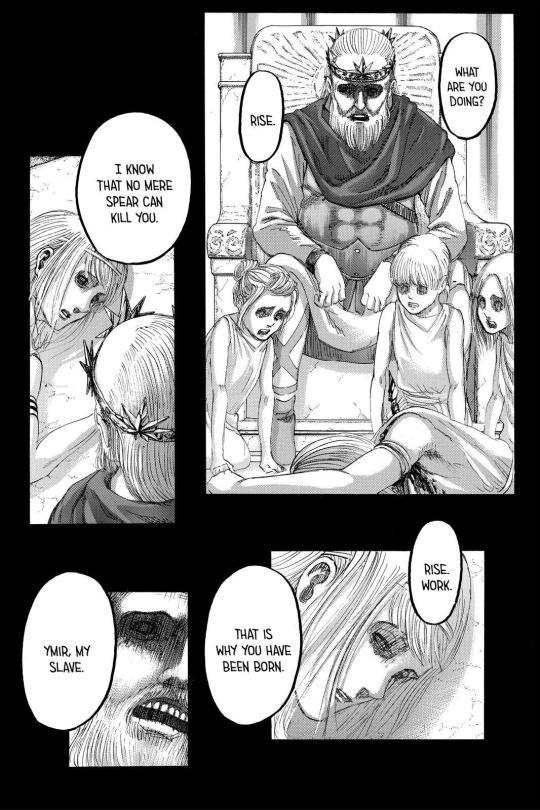
It's how she is lead to percieve herself that keeps her a slave.
This is interesting to me because this seems to reflect Armin's initial character resolve. The only reason he didn't believe in himself was because of his own, negative, perception of himself. It's through an alternative perspective given through Eren and Mikasa he grew to see himself in a different light. His arc is one of the first arcs in the story that involves a character gaining nuance in their perspective (technically Mikasa has a moment like this before him, but I think Armin's arc fits the comparison better because it very specifically relates to his self-image):
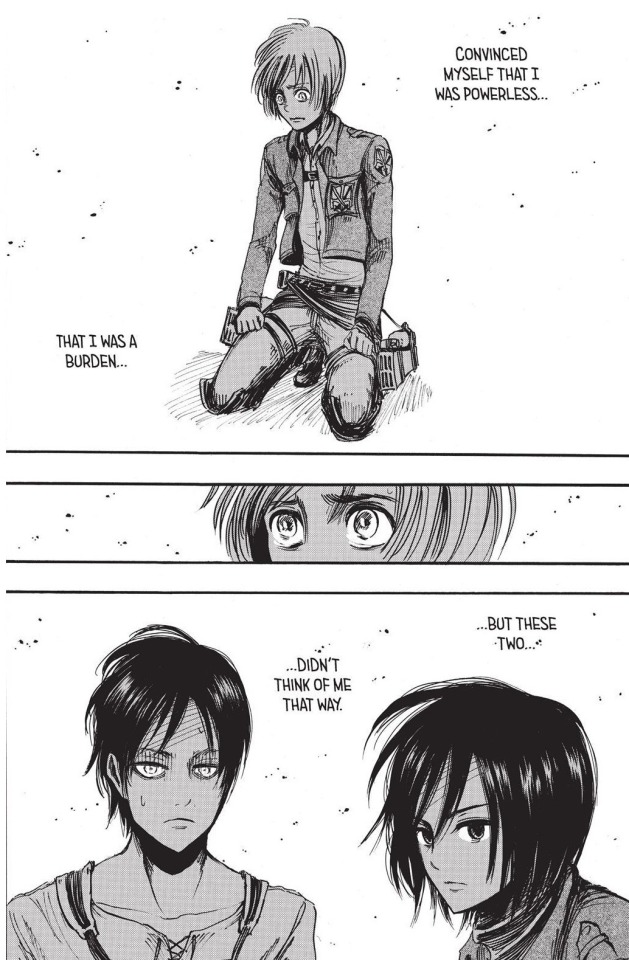
(Chapter 11)
This later also evolves into the Marleyan Eldians' single-mindedness and unawareness of playing into a corrupt system. Neither Ymir nor them simply never get an opportunity to see the world differently/in a more complex light.
In the case of a more typical damsel, the rescue would have had a much more straight-forward and simplistic explanation and through that in my eyes would have been much less interesting and I really appreciate whenever a story understands abuse like this.
Related to this, Eren's speech in this chapter probably makes it one of my favorites.
There are some uncertain connotations to it, as Ymir truly probably is in no good emotional position to make her own decision and Eren ultimately gives her two very specific options to choose from, but I think his words are genuine and the point of the speech still stands.
It's a powerful speech that says everyone is an autonomous person and is not obligated to be bound to anyone:
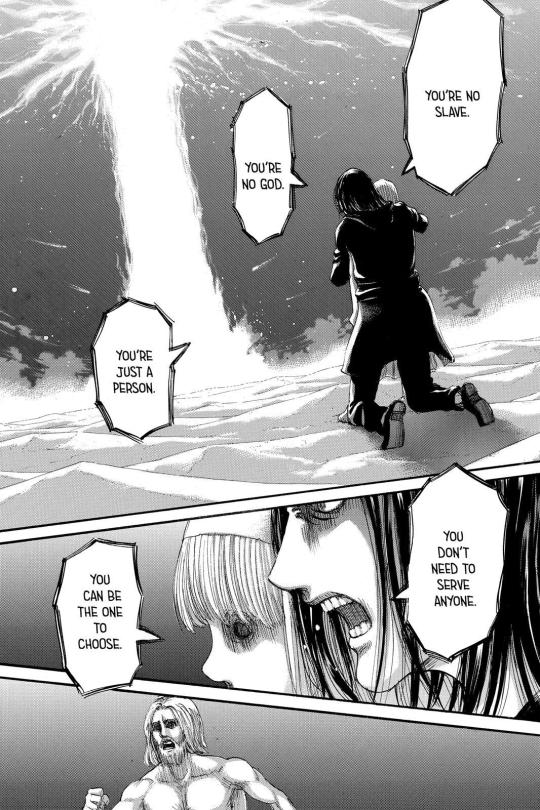
As said, the elements of a typical damsel in distress story are here, but I think it's more human than just a standard crying girl asking for help situation and on a meta level, the story says that whoever is in a similar situation also has a choice.
As also said, you could tear this into pieces when you focus on a bunch of the technicalities surrounding it, but I think as a general sentiment I really do think it’s incredibly powerful.
I mentioned how this chapter commented on how powerful men exploit women, but I think it's more gender neutral than it might initially seem. I think the general feelings here would work just as well if were Ymir a boy, with the only difference probably being another woman being involved to force him to have children. The story has gendered aspects, but it handles them with not only taste, but also in a way where the general point isn’t gendered, similarly to Mikasa's backstory.
Related to this, I think the final element to look at in relation to Ymir's story specifically is Historia’s pregnancy. I think it made it directly much more harder to make natural.
It felt artificial to begin with, but before this, I was much more open-minded about it.
Okay, since Historia genuinely seems to care for everyone, maybe this could've been somehow spun around her sacrifice being genuine and of her own choosing, but now it's as literal of a representation of history repeating itself as it possiblt could get and whether Historia chose the pregnancy or not, subtextually it will always represent history repeating itself.
The pregnancy has a bunch of potential problems: erasing the gay part of a character (since Historia is the most overtly gay character in the series and this happens after her love interest is killed, it will come across this way even if it's not the intention), contradicting a character's arc, but more than that, at this point, I just don't see anything interesting and unique said through it specifically. All other options where the pregnancy is fake sound much more interesting to me.
If the story finds a way to somehow make the pregnancy work in a interesting way, I'll applaud it, but right now I don't see all that many possibilities in terms of how it could.
This chapter literally calls back to the image of the kind girl Historia saw in the book Frieda showed her that she went against and while this contradiction in her arc already existed just with the reveal of the apparent pregnancy, this now puts a big red exclamation mark on it:
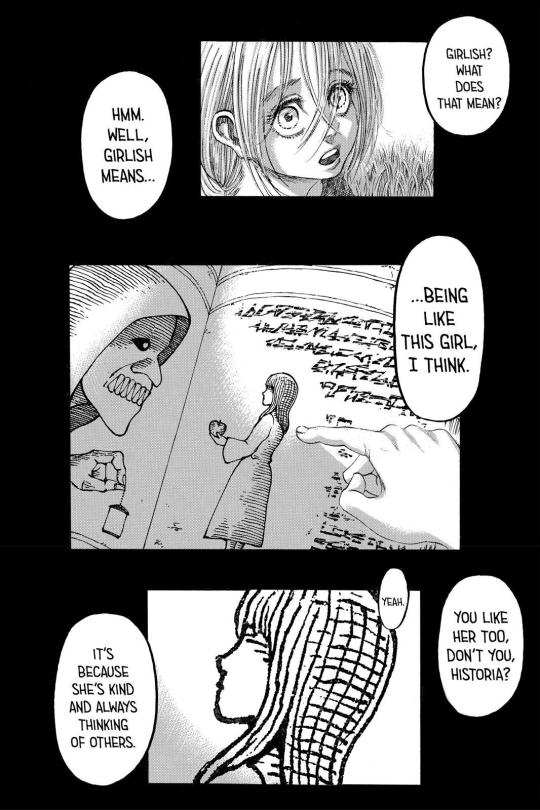
It's so obvious that the story missing this contradiction and not even addressing it would be extremely puzzling (which I do think it will).
More than anything, as if it hadn’t done this as strongly as possible already, this also even further (as it possibly could at this point), fortified the idea that something definitely, most certainly, without a doubt, is up.
Moving on, though, in the same vein as I said there are points in the real world where good and evil exists, there is actually a truth in history. History is a series of facts interpreted by people and with showing the "real truth" here I think the story dodged a dangerous potential implication about history not being factual.
I think it also fixed some of the potential implications with the historical imagery the story has been using.
Firstly, the Eldian empire was born through the exploitation of the weak. We don't even know if Ymir and all the other slaves were all actually Eldians, so depending how you interpret this, it takes away the potentially historically revisionist perspective of the Jewish analogue race ever being the oppressor. There is no place for "both sides" when it comes to the Jewish parallels because it's one of the most black and white situations in all of history. If nothing else, this element at least makes it clear that the story simply wishes to explore the thematic element of the dynamics between the oppressor and the oppressed the idea of power abuse.
Then, through making the encounter with the parasite creature happenstance and the Titan power not biologically inherent to Eldians, it removes the potential implication of the Jewish analogue being biologically different, therefore being "special" compared to other races, which is not the case with any race.
The element that has been there for the longest in my eyes and I think didn’t even need to be elaborated on because it’s been there and explored so much already and that always removed the possibility of the story (at the very least intentionally) being racist to me, though, is that the story treats all characters from all races the same without ever resorting to using caricatures or excessive stereotyping. The Eldians specifically are the main characters of the story, with there being equally good and evil characters among them.
The key element to racism has always been othering and dehumanization and the story for the most part makes sure that even the characters that are awful people have fleshed out perspectives.
I think what also helps in this chapter specifically is having more of a history-inspired than strictly historical situation, showing it all through a fantasy veil compared to the more direct usage of imagery with Marley and the Marleyan Eldians.
Finally, I really liked the potential Titan lore this chapter presented us.
I think it's really neat how it might potentially connect mythology and biology with the possible inspiration being, both, the prehistoric creature Hallucigenia and the mythological dragon under the roots of the world tree Ygdrassil, Nidhoggr, more than that, though, I really like the potential "nature you scary" element of the Titan origins.
The creature driving a horror story usually either isn't explained or is explained through something like aliens, lovecraftian horror, a human-made catastrophe or an experminent.
In this case there are elements of all of these in here and I think any of these could still be revealed to be the direct origin of the Titan parasite, but I really like the potential "nature you scary" element here because we usually always look outside of our world to find horror because we fear what we don't know, but Earth's own nature has plenty of that, too.
Nature can be really unsettling and horrifying at points and I’d like to see that being taken advantage of more.
Overall, though, I really liked this chapter. I think it might be one of my favorites because of Eren's speech, but I also really enjoyed it for it's "show, don't tell" aspect. Sometimes one image can say much more than a thousand words and I think this chapter did a really solid job with that.
113 notes
·
View notes
Note
Maybe Allen is suppose to be the "Adam" for Innocence like how the Earl is "Adam" for the Dark Matter side. Adam will be the one to populate (though w/all this flood talk it's technically Noah but dgm isn't a copy paste of it's inspirations) or decide what God the world will live under. In the Bible Adam failed his duty and Lucifer became the god of the world under Adam's watch. Jesus is often referred to the 2nd Adam who died to cover all sins (even original started by Adam and who will later -
2 come back again during the end days (final battle) to save humanity from destruction and take away Lucifer's control of Earth and god status of it. Then Give humanity back it's authority of Earth. Does this sound a little familiar? Kind of what the Noah have been spouting about gods and current humanity's fate. The Innocence might have picked Allen to be their Adam to enforce their plans for Earth. But this is dgm and there's one issue Allen has. He Dies Thinking Another Can Do It Better. -
3 Not only that. We've seen in DGM the 2 sides of this War aren't so black and White. What does Innocence want? Are the Noah wrong in how they do things but ultimately telling the truth about other things? If Allen wants to save the world I think he's going to have to not conform to any 1 side we've seen so far. So far no side really prioritizes saving humanity/Akuma or trying to understand everything going on like Allen. Allen has to escape the fates both Innocence and Noah desire of him -
4 and keep questioning status quo if he wants to do any long lasting good. Which thankfully is actively doing. But he also has to sacrifice himself... Better. Past Allen sacrificed himself for Nea and New thinks he'll do it willingly again when he figures it out. But Allen needs to really enforce in himself, yes he's important and ONLY he can save the world in the best way possible. Sacrifice is a noble thing but Allen can't do it too recklessly. He has to know when/how it can be used the best.
Oooh very interesting points about the Bible! I admit my knowledge there kinda dates from a while back so that’s always interesting to hear back. I’ve mentioned before not being too too found of the Allen/Jesus stuff (or well more like “I want to find more in the Ancient Testament before jumping to the New one) but like you said i doubt it’s a 1/1 equivalent when it comes to its inspirations (after all yeah, “Adam” and “Noah” already share a character not to mention the fact Mana is... a Cain figure if i don’t mix up the two? so yeah that’s a lot to just keep mixing up) so for all we know that would fit.
But also from what you’re developping if i’m getting it right we could be in a situation where the Innocence wants Allen to be the Second Adam (so kind of the Jesus part?) but ultimately Allen runs away from the Innocence. He wants to find another way. He questions both statusquos offered to him. So there Allen seems more like he’s rejecting whatever role “God(s)” would put on him to walk his own path.
And you are entierely right about the both sides and their actions. There is something extremely confusing because the Earl does mention there is a secret to the Akuma and the Black Matter that does make it all the more puzzling.
If we go by the Flood story, we could almost expect the Earl to pick some “animals to survive the Flood” type of people but this is clearly not the treatment given to the Akuma, first the way they are picked would be seriously weird if it was the case (why would it be the people who are loved that are saved and not the people who loved so hard their love had powers that challenged death for instance), second because there is a complete disregard about how the human soul evolves (Not hesitating to kill the Akuma, from Road making them self explode to Skinn beating one up, and the fact each evolutions consumes the soul and crashes it, which we’ve seen graphically described both from Allen’s eye on each evolution and on how the Dark Matter felt on Alma)
But there IS something going on with the Akuma and this is extremely puzzling if this is the part of humanity they are trying to preserve, unless there are far more secrets we are yet to discover about the Noah’s sides. But there we are: the Noah sides is full of secrets. There is also this whole focus they have by “playing by the rules” when the Order does develop the Third Exorcist Program.
So the whole morale the Noah have is still a weird one and far too complex for just “we want to destroy all of humanity”. Especially considering that there is a focus also on the Earl having a softer side for some humans in the very chapter in which he mentions the secret of the Akuma and i still don’t geeeet itttt.
Meanwhile the innocence have a more clear goal but shady execussion: Destroying the Noah and the Dark Matter. And it’s not even really “saving” people anymore per se, it’s almost like saving people is a sidenote. Or at least that’s how the Order ended up taking it. But let’s be real would the Innocence really want people to be saved this much it wouldn’t do a whole “chosen one” thing with its “apostles”. This is so unnecessary cruel from “the good guys” to force its fighters into the fight while others who would have pure souls would be rejected as fighters just because they’re not around the right innocence at the right time? how do you focus on saving humanity after that?
it’s like the Innocence has this whole righteous belief of the prestige of the Chosen One Narrative at the complete disregard from the fact than humanity is far more intimate than the big picture the Innocence sees the world through.
And the Order had lost its ways due to the very despair the innocence forced them through. Sure if they can save people the better, but when it comes to the Akuma the end justifies the means and they can’t afford to save the souls of all the suffering when there is so little means to do it. So the Order priviligize a branch of humanity instead of another, despite the fact both sides are just as much victims.
to me it feels like both the Innocence and the Dark Matter are lost in their Divine impact and don’t consider the individuals of the wars moreso that they consider their Mighty Goals and the Mighty way it presents itself. So the Noah are all about destorying the World with a side of... doing shady things, while the Order”s ‘preserving the world” comes with conditions of mostly being “or at least let’s destroy those who are hurting the world”.
Allen wants to save people. He’s a destroyer who wants to save. He wants to save all people alike, he even tries to “save” Tyki from his Noah side because his human side deserves to have its happy life away from the war. In the end Allen doesn’t care what the innocence, anything had planned for him. Like yes I think he is the Destroyer of Time, but if it happens it’s not Allen chosing it, it will just be because.. it happened. Because Allen doesn’t care about what the Big Entities put him through
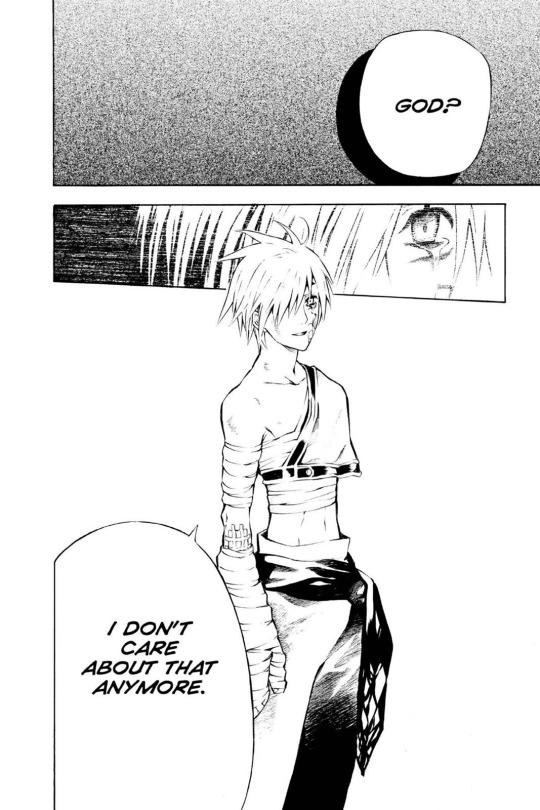
The Entities themselves are the least of Allen’s interest: he uses them more as a tool to save humanity. the Innocence alligns perhaps more with his goals, but as it is for now, neither of the sides actually provide Allen with what he especially wants: to protect. Not to destroy.
So there is a lot to be said about Allen rejecting both path the Noah and the Innocence is paving in front of him. In the end like Cross says. “A path is something you create as you walk it.”. So neither sides would force Allen onto one. He will create his own.
And I think that’s what is most likely to be happening with Allen himself. And like you said, neither sides are extremely trustworthy at this point and Allen rejected them both.
So when it comes to sacrifice- yeah Allen tends to self sacrifice a lot and it seems both sides are expecting him to do so to. And in a way he still refuses to give in without trying to fight back at leasT.
The finality of how he would be willing to give himself up... I think the thing is that Allen doesn’t see Death as “a sacrifice for othrs” because there is so much far more he can do while being alive. Sacrificing his whole freedom, his possibilities for happiness by walking away from the war when he lost his innocence are htings Allen is willing to do: but die is something you would truly have to put him in a corner for him to decide to do it. There is so much more that he can sacrifice than his own life.
It’s just... gahh such a meeeess and it hurts a lot orz. I feel like i lost myself into my point there though so huh... sorry? Hope it remains clear skjhfdkj
2 notes
·
View notes
Text
I've always felt like TYK finishes somewhat abruptly character development wise. Although the main plot and themes are wrapped up, it feels very much like when I can't think of any more to write and just need to finish it off (lol). Obviously I write a lot of post-canon WenZhou fic so I'm heavily invested in that, but I also think about Zhang Chengling. ZZS might be the protagonist and the perspective character most of the time, but Chengling is more of a "hero" in the shounen manga sense.
He loses his family and is suddenly thrust into a plot while having no idea what's going on and zero skills to cope. He gets a grumpy tsundere teacher and decides he wants to get stronger! He collects a found family. He learns about his dad's generation's fucked up past, which his generation is now paying for. He learns about how people are not as clearly good or bad as society makes them out to be. He actually gets to fight on his own initiative with Gu Xiang's plot to free Gao Xiaolan. He gets given a magic-or-maybe-cursed sword by a beautiful prince! He gets to make his own decisions about what kind of revenge he wants, and what kind of life. And, finally, he gives the biggest baddie the final killing blow (completely off-screen). This is like the opposite of a YA novel revolving entirely around the kids.
So TYK is only the opening act to Chengling's story. He's got two OP dads, has a lot of potential, is probably way stronger than he should be for his age, he's got his special legendary sword... what kind of adult is he going to grow into? He really should get his own novel because I can't pin it down on my own. (There is a similar silly kid disciple in Guardian who is a bit older but also doesn't really get much further in his development. The best idea I can get is Lu's students from Can Ci Pin, none of whom individually are the same character type as ZCL. They all become high achievers who really value their found family above everything else and don't have much patience for black and white morality.)
He's certainly not going to be like the heroes of the past, blindly following their predecessors and repeating platitudes. It's not like WKX and ZZS are going on a murder spree as soon as the plot is over, but ZZS did admit right at the beginning of the novel that while travelling he was stealing from the rich and giving to the poor (including himself) and breaking into wine cellars to drink all the wine. But he draws the line at dining and dashing, even when it was YBY who ate all the food. So there is definitely some moral flexibility there. It also should be mentioned that ZZS is a lord who knows jack shit about actually working for a living and while WKX seems like he has more domestic experience he also spent most of his life stuck on a mountain surrounded by cannibals and serial rapists. Basically, I think Chengling is also going to have a very idiosycratic sense of morality and questionable life skills.
I've hit Ep 24 in SHL when they get to Shiji Manor. There are things they do in SHL that I just don't prefer, but one thing I actively think is incorrect is how Chengling is first told he needs to take revenge for his family, then that he needs to carry on the name of Shiji Manor, and then he's also supposed to learn all of the mechanical stuff from Longyuan Cabinet? And learn all of WKX's family's techniques?? Like, are you trying to give the child a mental breakdown before he's twenty?? Sure, ZZS and WKX end up immortal but the assumption is always that ZZS is going to die and WKX doesn't want to acknowledge his role as shishu so all this history is on Chengling now.
In the novel, we see early on that the adults are pressuring Chengling to avenge his family and hype up this attack on the ghosts, which he doesn't want to do. He's also having some major survivor's guilt. But ZZS never tells him what he should or shouldn't do. He repeatedly asks Chengling whether he wants to follow ZZS or do something else – and ZZS isn't always super great at seeking consent when he doesn't feel like it so its especially obvious when he does. He repeatedly implies that Chengling should think about who is really at fault for what happened to him, whether fault even matters, and what he really wants to do without trying to influence him in any direction. And ZZS will support him in whatever decision he makes (because he has nothing better to do, not because he cares or something, baka).
I think this comes directly from both ZZS and WKX's experiences of being forced to grow up too soon and take on too many responsibilities at an early age. Like most parents, they want to give Chengling what they didn't have after their own respective parental deaths. I just really have a hard time seeing ZZS thinking "Turns out becoming the leader of a sect as a teen really sucked and kinda fucked me up! Now I am going to do this to another child." It just violates all the central themes I really liked related to cycles of trauma, blindly going along with societal expectations, and breaking with unhealthy tradition.
(I also don't really like turning Ye Baiyi into Grandpa Cop even though it gives us that great SHL scene, but that is a different essay)
1 note
·
View note
Text
This is something that's been on my mind for a long time. Long ramble under the cut
TL;DR: Grazer-razor has some of the worst black and white mentality I've ever seen and I can tell he has never critically examined his biases a day in his life.
Because I'm a terrible little gremlin who can't leave well enough alone, I've been reading these posts
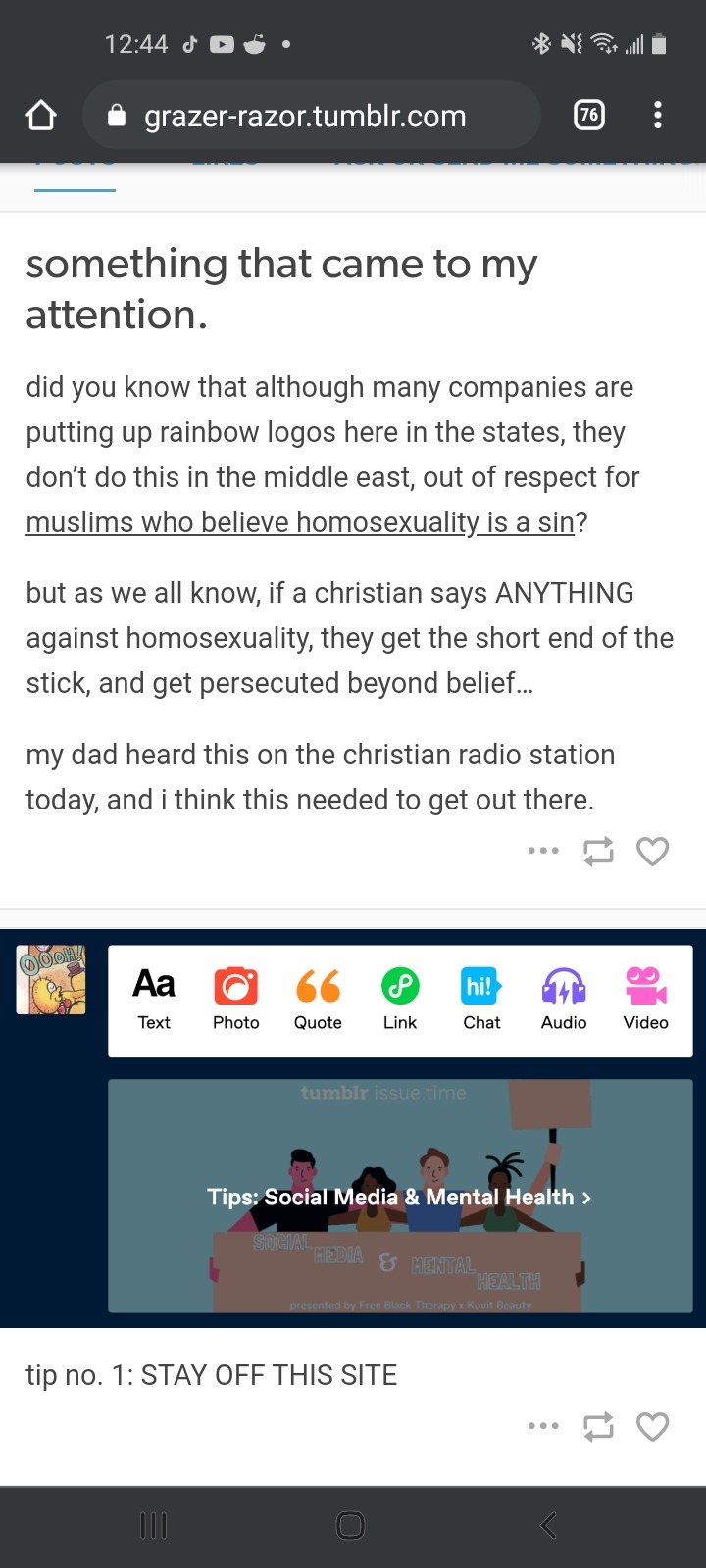
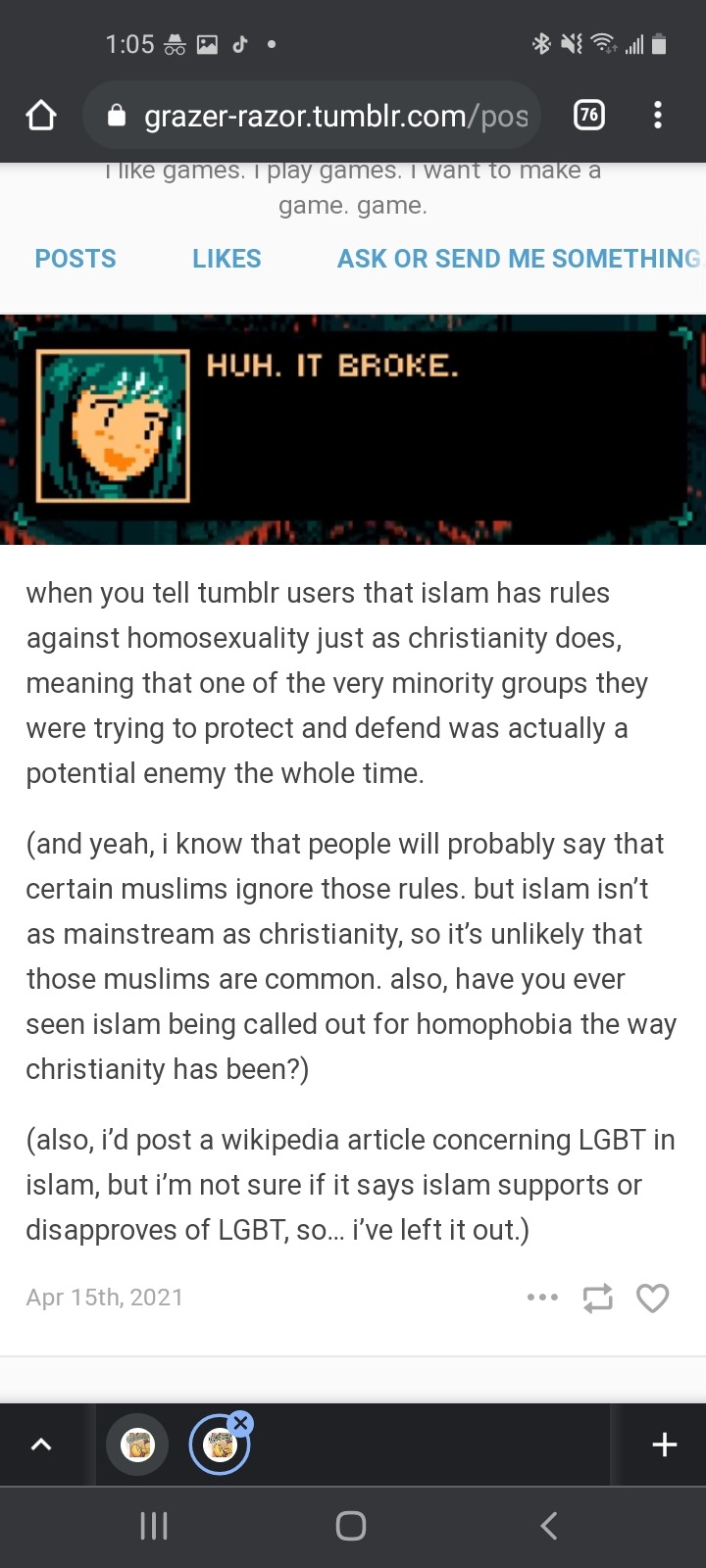
Ignoring the absolute stupidity of these statements (I'm pretty sure the lack of rainbow logos is because in many middle eastern countries, homosexuality is a crime and these companies just want to make money. But I'mnot going into the nuances and implications of rainbow capitalism today.), something stood out to me.
Does Grazer... genuinely think nobody has ever criticized the Muslim faith? That we all ignore the homophobia present within the religion just because they're a minority? Correct me if I'm wrong, but I've seen even some of the most staunch leftists criticize things like their horrible treatment of homosexuality or the rampant sexism often sanctioned by radicals. Even other Muslims, especially women and lgbt+ Muslims, have been critical of these things.
It wouldn't shock me if Grazer believedthat anyone who supports Muslims believes they can do no wrong. After all, he thinks any criticism of Christianity is hatred, and dismisses any harmful things Christians do as not being "real" Christianity in a classic case of the "No True Scotsman" fallacy.
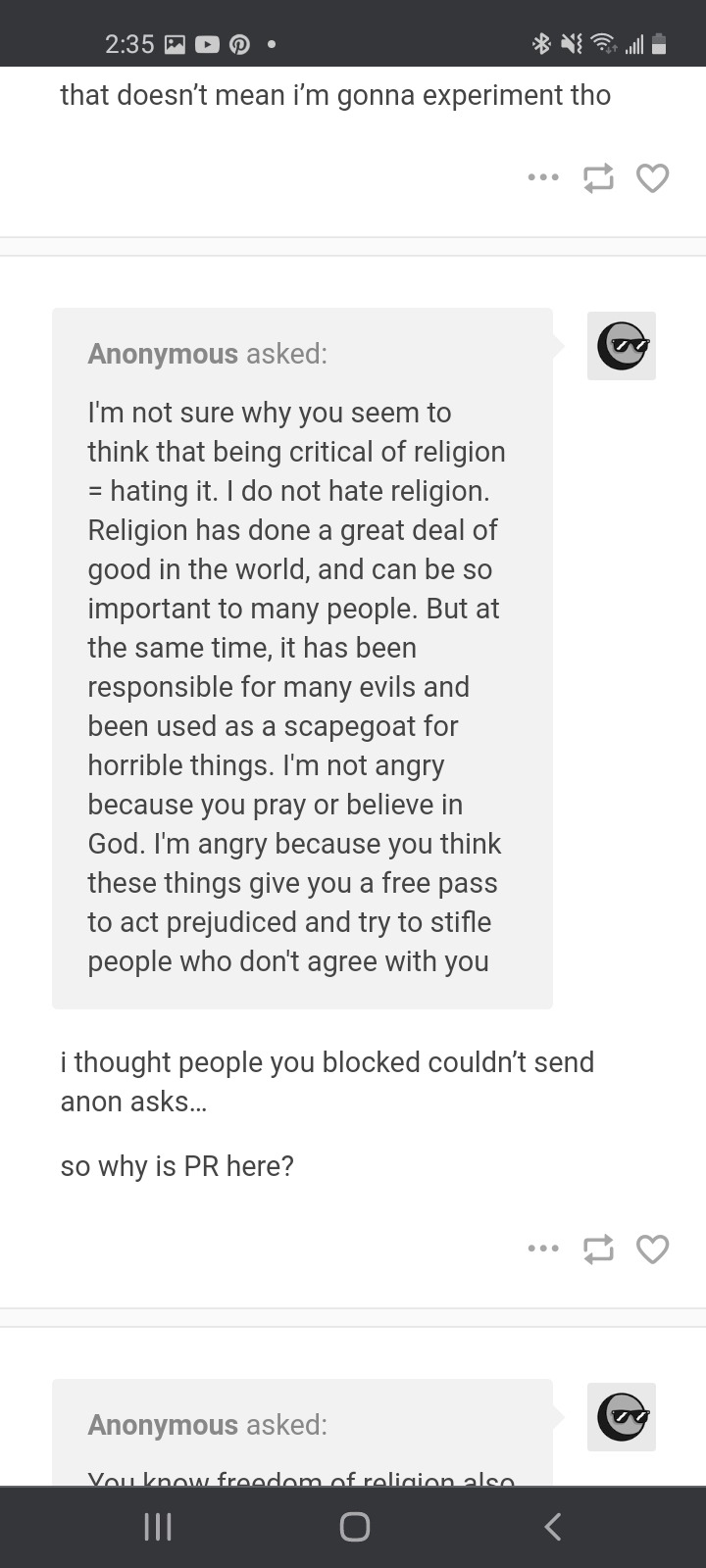
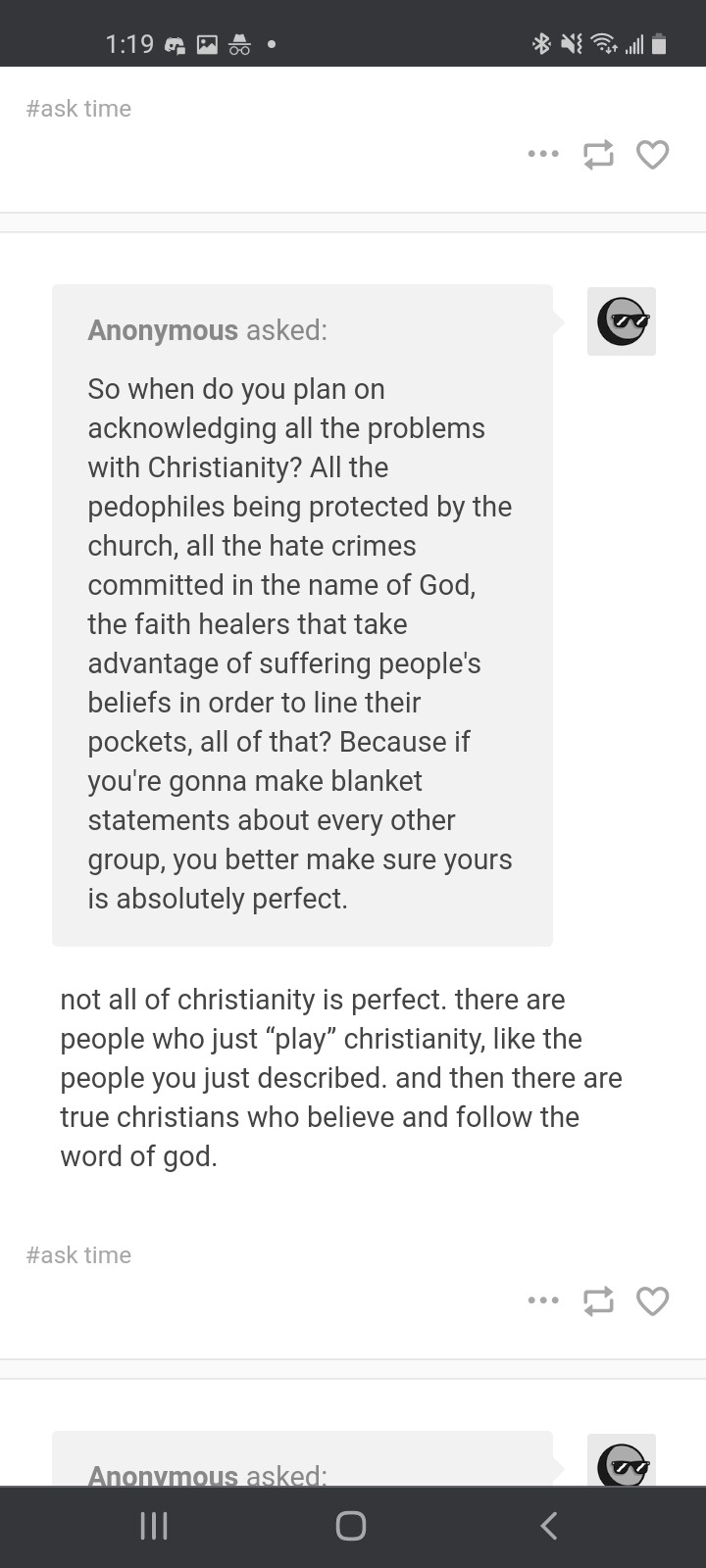
Note how he didn't even respond to the first asks comments, just accused them of being me (because obviously any time someone sees his blog it's all my fault /s)
So it seems like in Grazer's mind, there are only two options when it comes to religion: Uncritically praise and defend everything a religion does no matter how heinous it is and justify it because it's done in a God's name, or condemn anyone who practices it as hateful terrorists. Because he doesn't see people doing the former for Christians, he automatically assumes that they're doing the latter, and vice versa for Muslims.
Also note how he gets mad when muslim faith is "respected" (again, homosexuality is criminalized in many of these areas) but then demands a secular children's show cater to his religion for the sake of his precious childhood.
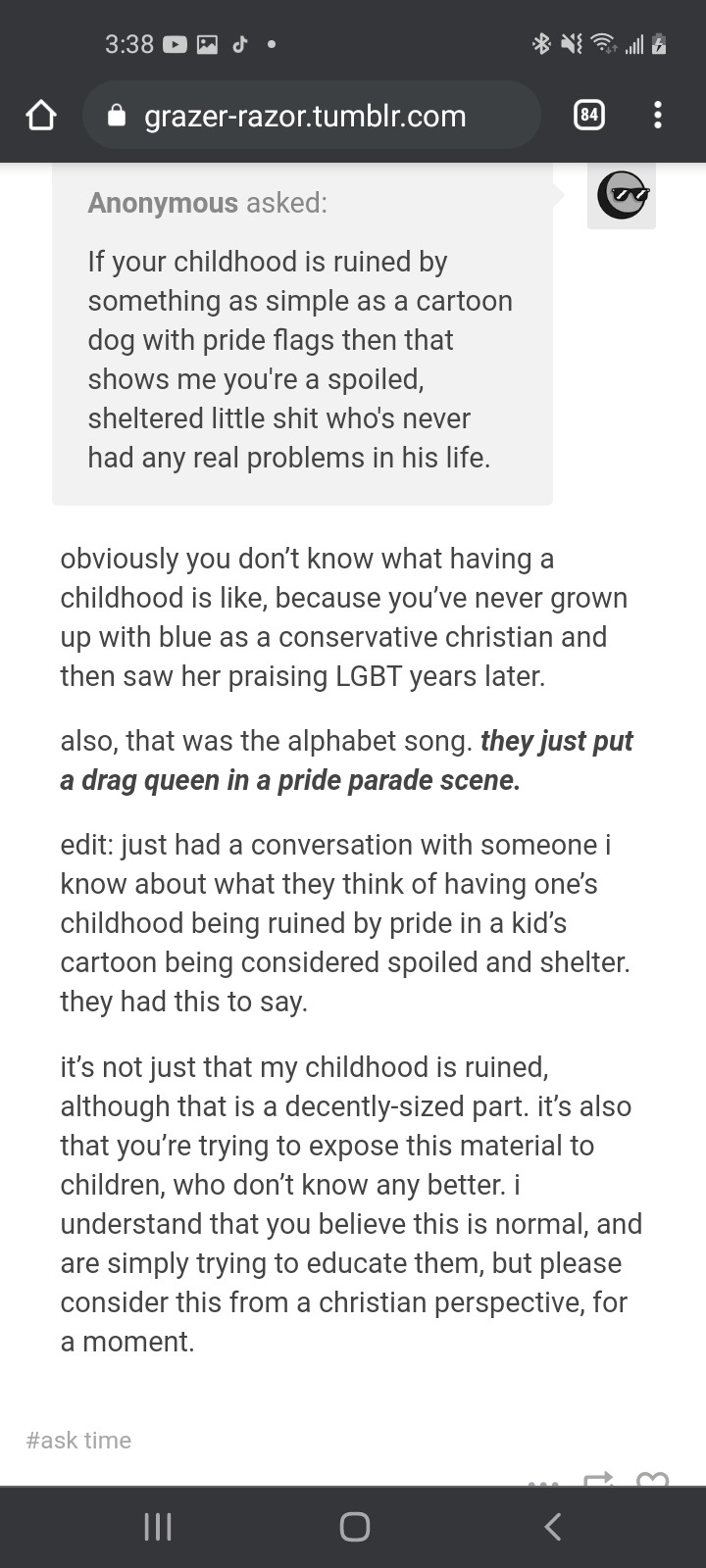
(Also, can we just talk about the absolute fucking cruelty in this answer? There are people out there that had their childhoods ruined by abuse, illness, losing loved ones, homelessness, poverty, bullying, near-death experiences, having their countries torn apart by war, a shitty foster care system, teen pregnancies, and so many other things that can absolutely destroy a life. Grazer's was ruined by… *checks notes* a cartoon character supporting gay rights and a drag queen singing a cutesy children's song. So yeah, if that's the worst part of his childhood he's pretty damn lucky, and the fact that he has the gall to still complain absolutely makes him selfish and ignorant. It's disrespectful, plain and simple, and if he were truly a good Christian he'd have some compassion.)
Okay, so Grazer has some weird "rules for me but not for thee" shit when it comes to religion. This isn't news. Where am I going with this?
Well, turns out he has this opinion about more than just religion. Know how I know this? His response to ESRB ratings and trigger warnings.
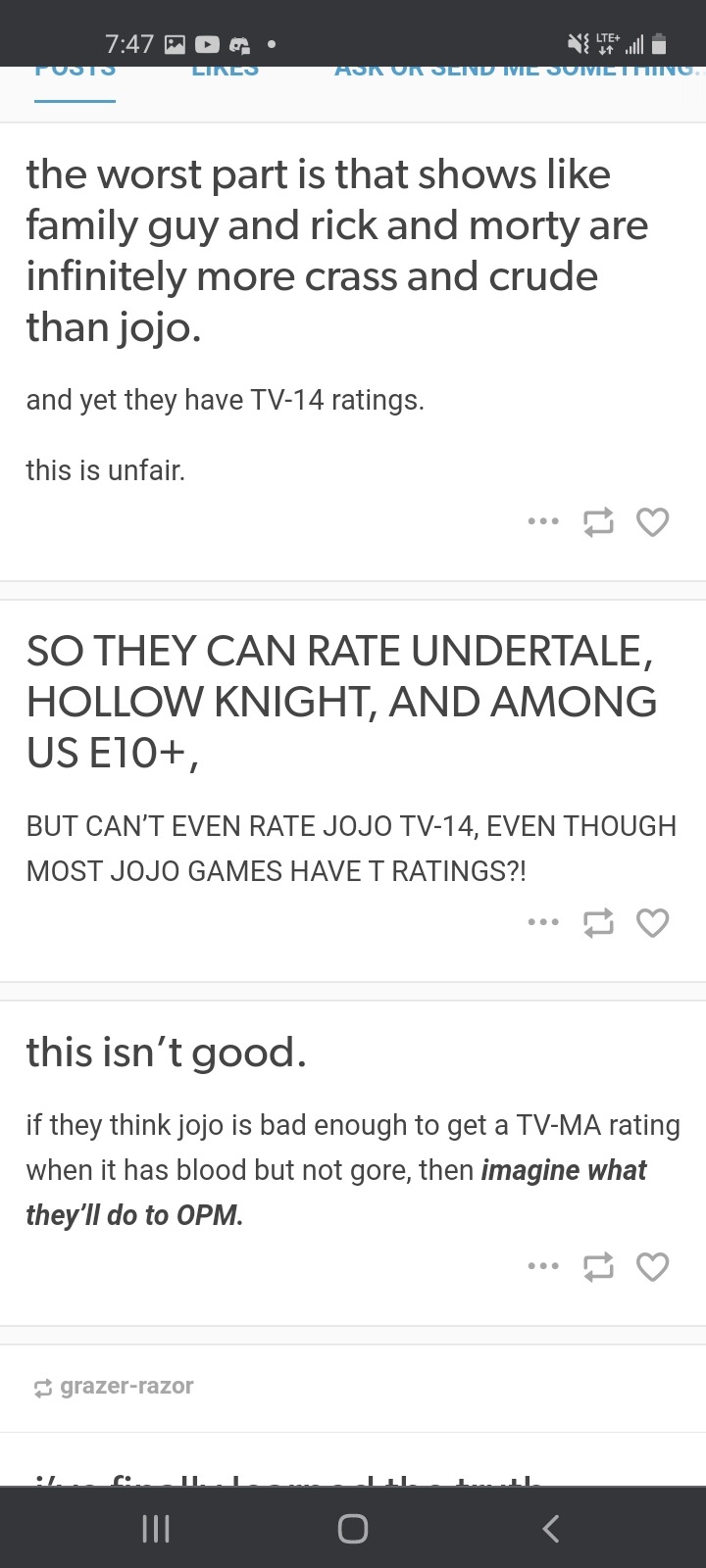
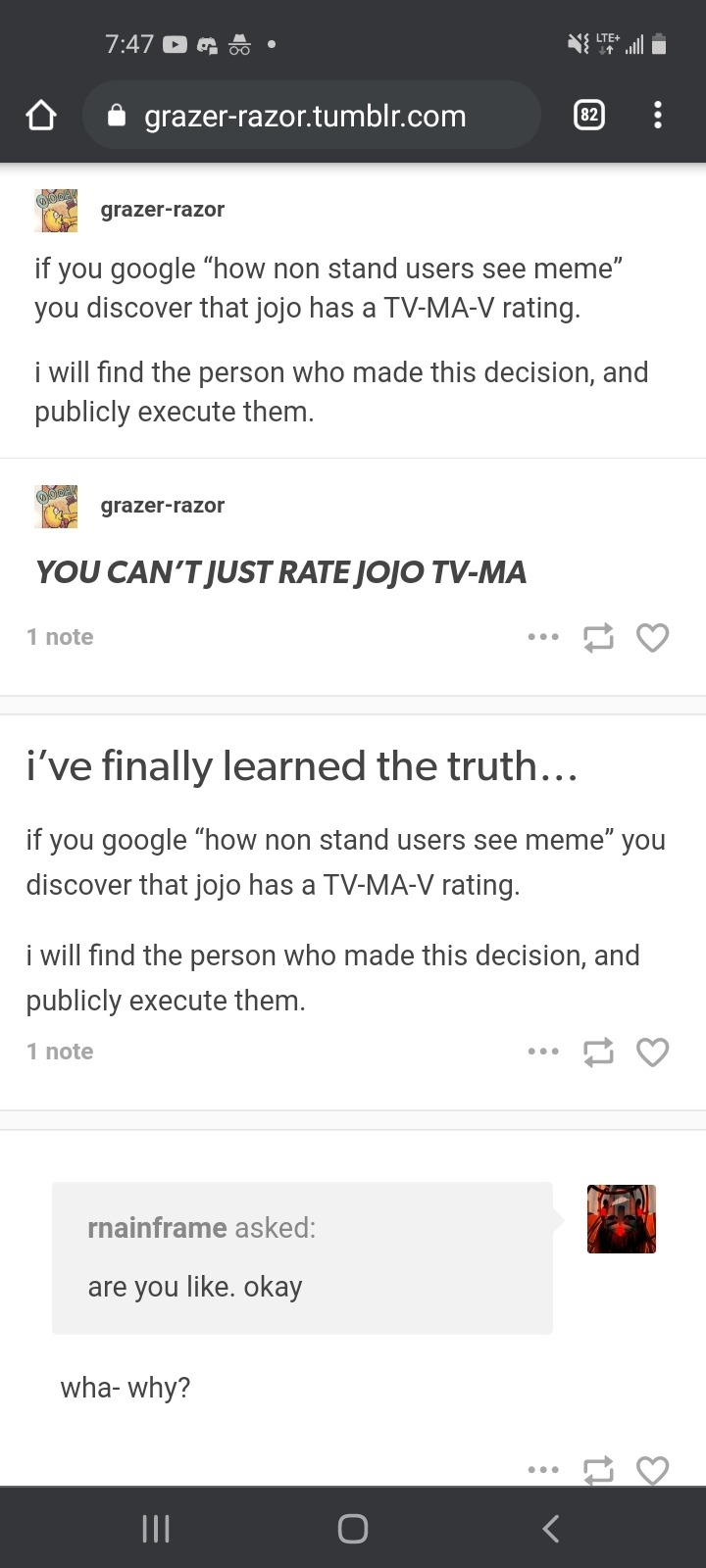
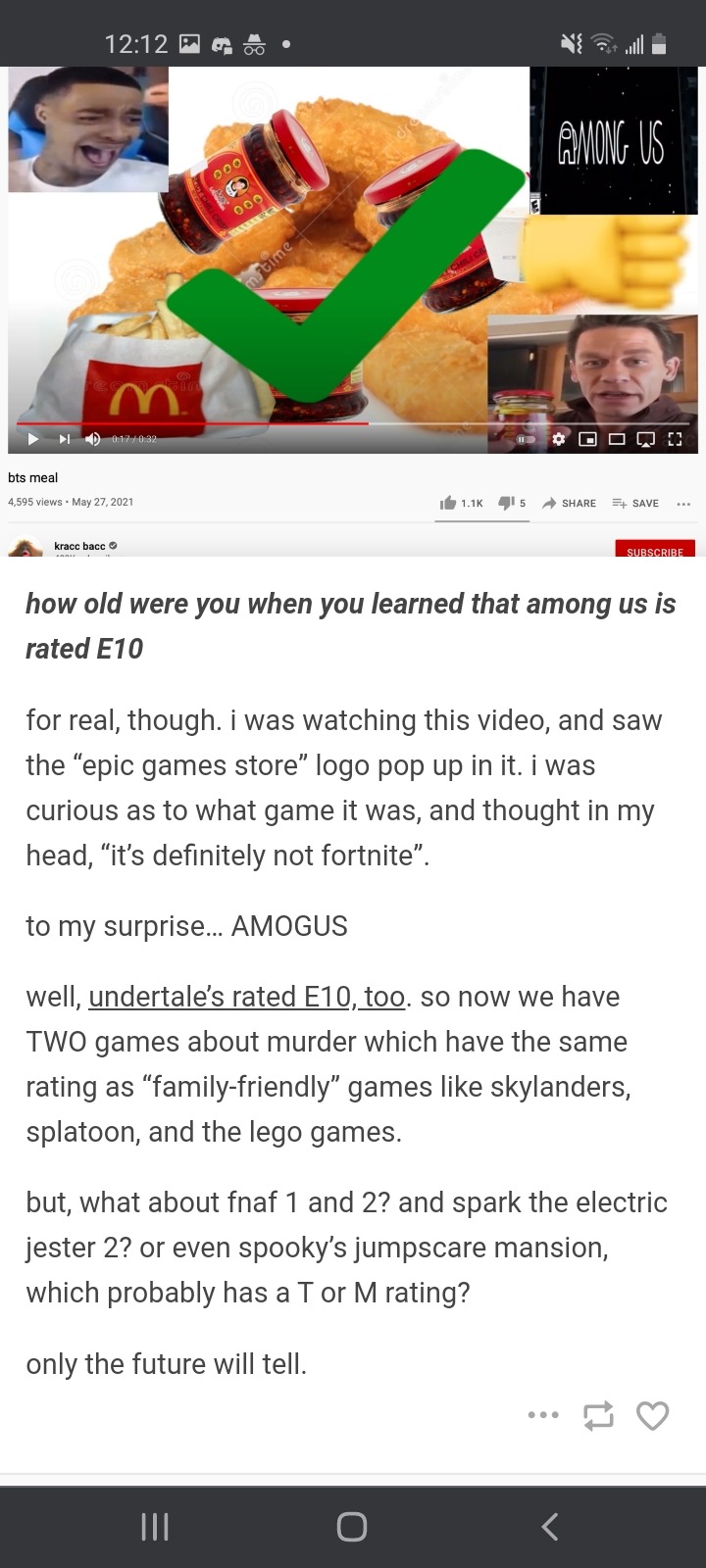

So it seems like Grazer sees the ESRB as some sort of moral compass, in a way. Something being rated E or E10 means it's pure and good and wholly unproblematic, while anything higher means it's evil and disgusting and he can't even look at it.
This is further confirmed by this post, where he flat-out states he sees the ESRB as deeming what things are and are not morally acceptable.
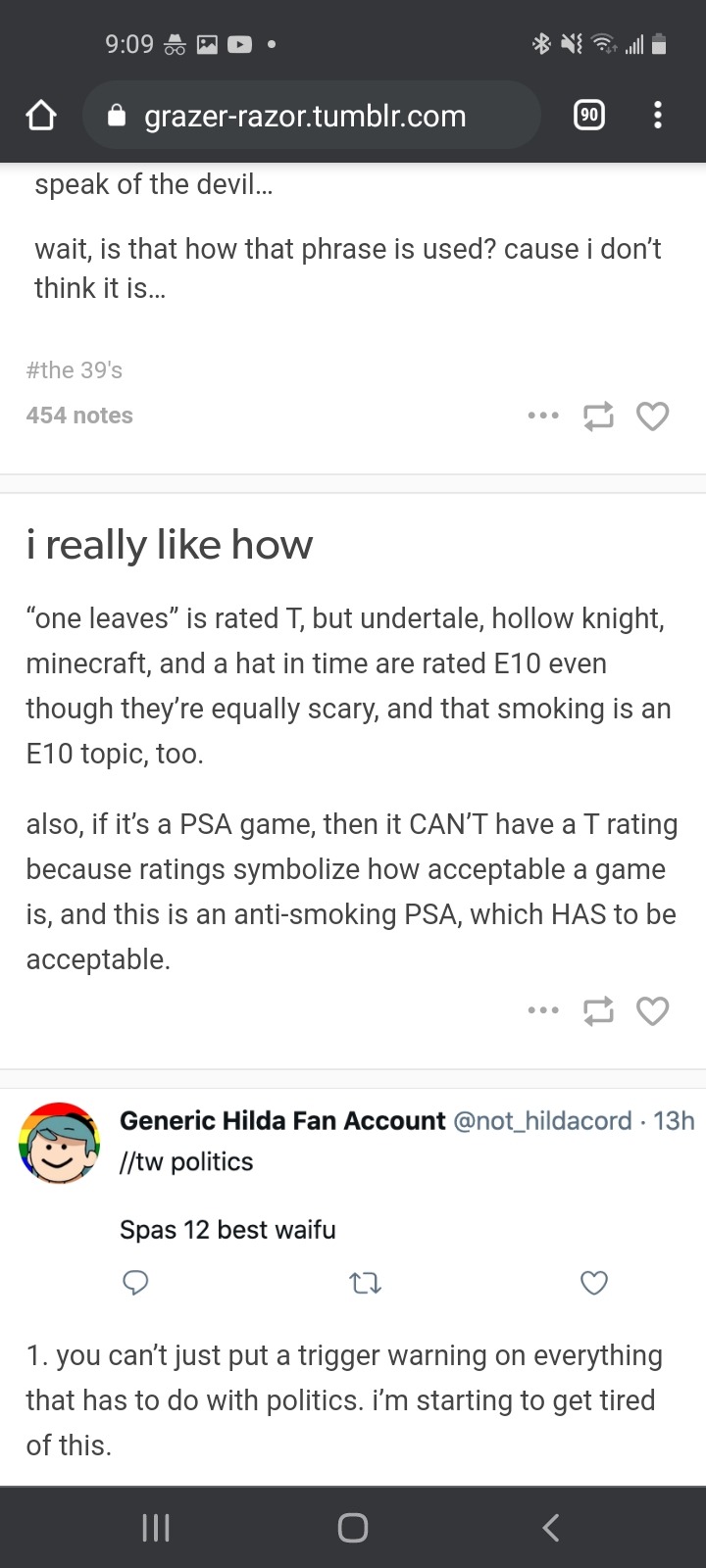
Now Grazer, I'm gonna explain this as best as I can, because it seems like you don't quite understand this. Read very carefully.
This is not the purpose of the ESRB rating system.
I repeat, this is NOT the purpose of the ESRB rating system.
The ESRB does not decide on what is and is not morally correct. It simply says "This game contains these topics, and as such is most suitable for people in this age group.". That's it. It's a guideline, not a rule.
Let's take cartoon violence, for instance. It's a very common warning the ESRB puts on games. Almost every game from Mario to Sonic to Crash Bandicoot and even Monster Tale has this warning. These games are all rated E for everyone. Does this mean those games are promoting violence to children, or claiming things like Bowser kidnapping Peach or Pinstripe trying to gun down Crash are perfectly okay and morally correct? Of course not. It's simply saying that these games contain mild, non-graphic violence, but most children should be able to handle seeing it.
On the other side of the coin, let's take a look at the warnings for nudity and sexual themes. Most games that contain these topics are rated T at the lowest and AO at the highest. This obviously isn't saying that nudity and sex are inherently bad or evil. All it's saying is that these topics are best handled by adults (And, regardless of morality, it is illegal to distribute sexual content to minors unless it's meant to be educational, like a health class textbook).
A few extra points:
. Games can be rated different things in different countries. Different countries have different regulations. Do you know why the blood in Danganronpa is pink? It's because in Japan, games with excessive amounts of blood and gore are given a Z rating (Japan's equivalent to an AO rating). They got around this by making the blood pink, securing the game its desired M rating. Meanwhile here in America, Mortal Kombat is allowed to show as many graphic, brutal deaths as it wants and still receive an M rating.
. ESRB ratings are not legally enforceable. I was so convinced as a 16 year old that the employees at gamestop would try to card me or something when I was picking up a copy of Bayonetta, and I was surprised when they simply rang me up in two seconds, no questions asked. It doesn't happen. For fuck's sake, one of the first games I ever played, at the tender age of four, was Soul Edge. A T rated game. The only instance ESRB ratings are legally enforced is in the case of AO ratings, as these games often contain incredibly graphic violenceor sexual content. If this outrage is coming from the idea that certain ratings will keep younger people from playing these games from a legal standpoint, don't worry. A nine year old is not gonna get arrested for playing Among Us. Just don't buy them GTA San Andreas or Leisure Suit Larry and everything will be fine.
. No two consumers are exactly alike. While one 13 year old may be perfectly fine with the jumpscares in Amnesia, another may be too scared to even go near the piano in Super Mario 64. That doesn't mean either of these games is rated incorrectly. The ESRB is there, once again, as a recommendation for the average consumer, and doesn't take individual experience into account. An individual experience is not their responsibility. It's also on parents (or you yourself!) To decide what the consumer can or can't handle.
"But Haley," I hear you say, "What if this piece of media DOES contain something morally bad?"
Well it's simple. You are allowed to like things AND still criticize the bad parts of it.
Hold on now, I'm not telling you that it's perfectly alright to enjoy things like Birth of a Nation or anything like that! Contrary to popular belief, there are some pieces of media that are truly too steeped in hatred and morally reprehensible things to be supported, even through a critical lense. The only merit things like that have is to serve as a warning: This is a terrible thing made for terrible reasons, and we should not allow it to happen again.
But outside of those rare circumstances, it's not so cut and dry.
Let's take a piece of media i actually enjoy, for instance, so you know I'm not a hypocrite: Persona 5.
Persona 5 is easily one of my favorite games in the Persona series. It does a lot of interesting stuff, the artstyle and soundtrack are (in my opinion) the best in the series, and overall it's very enjoyable for me.
But, like anything, it's not perfect. I'm incredibly uncomfortable with the hypocrisy the game has in regards to the sexualization of teenagers. While Kamoshida is rightfully condemned for his sexualization of teenage girls and Ann's persona awakening comes from rejecting this objectification, the game and story undermine it by not only putting Ann in a sexually revealing outfit, but also making light of Ryuji's sexual harassment by adult men (Allegedly Persona 5 Royal tries to fix this by making the men drag enthusiasts who think Ryuji would look good in drag and giving them more sympathetic personalities, but it's still really weird and hypocritical of the game to do this.). The teenage protagonist is also allowed the option to date adult women, including his teacher, and the game rarely if ever touches on the problems with this.
The game's homophobia also left a bad taste in my mouth. Aside from the aforementioned men who sexually harass Ryuji, the only other canon LGBT+ character is a bar owner who is either a drag queen or a trans woman (or both?). Sure, she's portrayed as being kind and protective of the protagonist, but there isn't much room to interact with her or learn more about her. On top of that, not only can the protagonist not romantically pursue his male friends (A feature that even the SECOND persona game had), he's not even allowed to give them gifts or platonically show affection towards them without the dialogue mocking him. The game that allows a teenage boy to date his teacher won't allow him to simply give his male friends a present.
And yet, despite those criticisms, I do still enjoy the game. I don't consider the game irredeemable garbage based on those poorly handled topics alone. And I also understand that for some people, those topics make them so uncomfortable that they don't want to play the game at all, and I completely respect that.
Criticizing the things you enjoy is not only normal, it's oftentimes healthy. Being able to step back and say "I like this thing, but I don't like the bad things it's done. This thing would be better if these issues were fixed." Sure, sometimes some people tend to complain a bit too much about the media they supposedly enjoy, but for the most part being able to acknowledge the bad with the good is a good skill to have.
Oh, wait, all of this means nothing because Grazer thinks that critically enjoying things is nothing more than an excuse to consume media he doesn't personally agree with. Okay then.
So if he can't even realize something as simple as "it's okay to criticize some parts of media that you otherwise enjoy", how can he be expected to look critically at a religion that he's been raised in and around all his life?
Soooo yeah, Grazer has some serious problems with black and white thinking that he refuses to acknowledge, further worsened by the fact that he's practically been brainwashed into believing that Christianity is the ultimate moral compass that everyone should follow. I understand that this tends to be an issue for neurodivergent people, but it's not an excuse for the actions he does that are related to these things (sending death threats to the ESRB, antagonizing others, etc.
2 notes
·
View notes